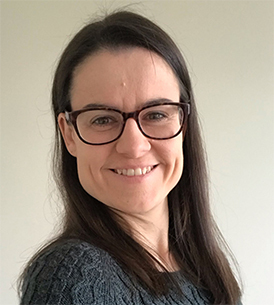Webinar
Supporting patients living with chronic non-cancer pain – the role of the pharmacist
Listen to our interdisciplinary panel discuss the evidence-based approaches for managing chronic non-cancer pain and the role of pharmacists in reducing opioid-related harms.
-
Cost: Free

This webinar has been developed with funding from the Therapeutic Goods Administration, Australian Government Department of Health.
Accreditation
It is recommended that 1 CPD hour be recorded for the purposes of self-directed CPD.
It is recommended that 1 CPD hour be recorded for the purposes of self-directed CPD.
About
This webinar has been designed to focus on key areas identified as important by pharmacists in a recent survey. The discussion will cover 4 main themes:
- Non-pharmacological and pharmacological management options available for chronic non-cancer pain.
- Strategies for improving consumer health literacy about the management of chronic pain.
- Recent regulatory changes for opioids and practical tips for implementing these in practice.
- Strategies for minimising opioid-related harms and misuse.
Meet the panel
For this webinar, we have brought together a panel of experts to discuss a case study and offer their perspectives on the options for management.

Kelly Abbott (facilitator)
Kelly is an Accredited Consultant Pharmacist working as an NPS MedicineWise Educational Visitor, based in Gippsland, Victoria.
Kelly regularly spends time in aged care facilities providing medication reviews and quality use of medicine activities, as well as conducting Home Medicine Reviews across her region.
She has worked at Gippsland PHN, written articles for pharmacy journals, worked in hospital and community pharmacy, and also had a brief stint in an American pharmacy.

Joyce McSwan
Joyce McSwan is a clinical consultant pharmacist and educator in the field of pain management. She wrote the MedRN Chronic Pain DVD training series for health professionals and has developed chronic pain management programs for PainWISE and Spendelove Private Hospital. She is currently the Clinical Director of the Gold Coast Primary Health Network ‘Turning Pain into Gain’ program and Australia Pain Society QLD Director.
Her contribution to the field of persistent pain has been recognised through multiple awards and collaborative industry partnerships with Griffith University, Bond University, Pain Australia, Australian Pain Society, the Pharmaceutical Society of Australia and the Pain Management Research Institute.
Joyce’s focus is on optimising care for those living with persistent pain, within the primary care setting using mixed funding models.

Suzanne Nielsen
Associate Professor Suzanne Nielsen (BPharmSc[Hons] PhD MPS) is the Deputy Director of the Monash Addiction Research Centre in Melbourne, and a current NHMRC Career Development Fellow.
Suzi has been a registered pharmacist for over 20 years with clinical experience in the treatment of substance use disorders, including in specialist drug treatment and community-based alcohol and drug treatment settings in Australia and the United Kingdom.
Her work has led to a greater understanding of prescription and over-the-counter drug-related problems, opioid dependence among people with chronic non-cancer pain, therapeutic use of cannabinoids and new psychoactive drugs.

Toby Newton-John
Toby Newton-John is an Associate Professor in Clinical Psychology and Deputy Head of School, Research, in the Graduate School of Health at the University of Technology Sydney (UTS).
Following clinical training in psychology at the University of Sydney, Toby moved to the UK to complete a PhD in pain psychology at Kings College London. He has worked in a variety of inpatient and outpatient pain services in the UK and Australia over the past 20 years and helped establish the clinical psychology training program at UTS.
He has published over 65 peer-reviewed articles and book chapters on psychological aspects of chronic pain. Toby currently supervises five PhD students and keeps a small clinical practice at Northern Pain Centre.
Learning outcomes
By the end of this activity, participants will be able to:
- Discuss with patients the limited role of opioids in improving pain and function for chronic non-cancer pain.
- Identify practical steps to help implement the recent opioid regulatory changes in practice
- Discuss with patients non-opioid management strategies and clarify their role in chronic non-cancer pain.
- Identify patients at increased risk of harms from opioids and recommend strategies for minimising these harms.
Health professional reading and resources
- Webinar slides: Supporting patients living with chronic non-cancer pain – the role of the pharmacist
Regulatory changes
- RADAR article: Opioids: New and amended PBS listings
- Opioids prescription hub (TGA)
Non-pharmacological treatments
- MedicineWise News: If not opioids, then what? – focuses on non-pharmacological treatment options for chronic non-cancer pain
Tapering
- Tapering algorithm – outlines the framework and principles for tapering opioids
- MedicineWise News: 5 steps to tapering opioids – focuses on safe tapering of opioids and provides commentary on the tapering algorithm
- Conversation starters – useful verbatims for health professionals to start the conversation about tapering with patients
- Patient action plan: Lowering your opioid dose – GP-mediated resource that aims to facilitate a discussion about the possible benefits of tapering, what’s involved in the process and help doctors and patients agree a planned approach
Additional information and support
- RADAR article: Use of naloxone for acute opioid overdose
- Medicinal cannabis: what you need to know
- Maximising opioid safety (Monash University)
- Reducing opioid harm in rural and remote Australia (ACRRM)
- Drug and Alcohol Clinical Advisory Service
- VIC – 1800 812 804
- TAS – 1800 630 093
- NT – 1800 111 092
- QLD – 1800 290 928
- WA – (08) 6553 0520
- NSW – 1800 250 015
- SA – (08) 7087 1742
Training and online CPD activities
- Pharmacy Practice Review – focuses on the important role pharmacists play to ensure the safe use of opioids for chronic non-cancer pain and to identify patients who may be at risk of harm from long-term use
- Clinical e-Audit – allows GPs to review their prescribing of opioids for patients with chronic non-cancer pain, with a focus on tapering opioids
- PainWISE – provide training for pharmacists wanting to offer this Professional Service pain management program that provides education and mentoring support for consumers
- Talking pain modules (PSA/SHPA)
- Better Pain Management: Clarity and confidence in opioid management – free e-learning program for primary care providers
Consumer resources
- Choosing Wisely consumer resource: Managing pain and opioid medicines – designed to bridge the gap between prescribing in hospital and community use of opioids, by encouraging patients to ask questions about their medicine
- Opioids information video – helps consumers make informed decisions in partnership with their doctors about whether to start taking an opioid medicine for chronic (ongoing) non-cancer pain
- MedicineWise app – provides consumers and carers with information about their medicines
- Prescription opioids: Information for consumers, patients and carers (TGA)
- Pain Management Network (ACI NSW) – video on pain and the role of medications
